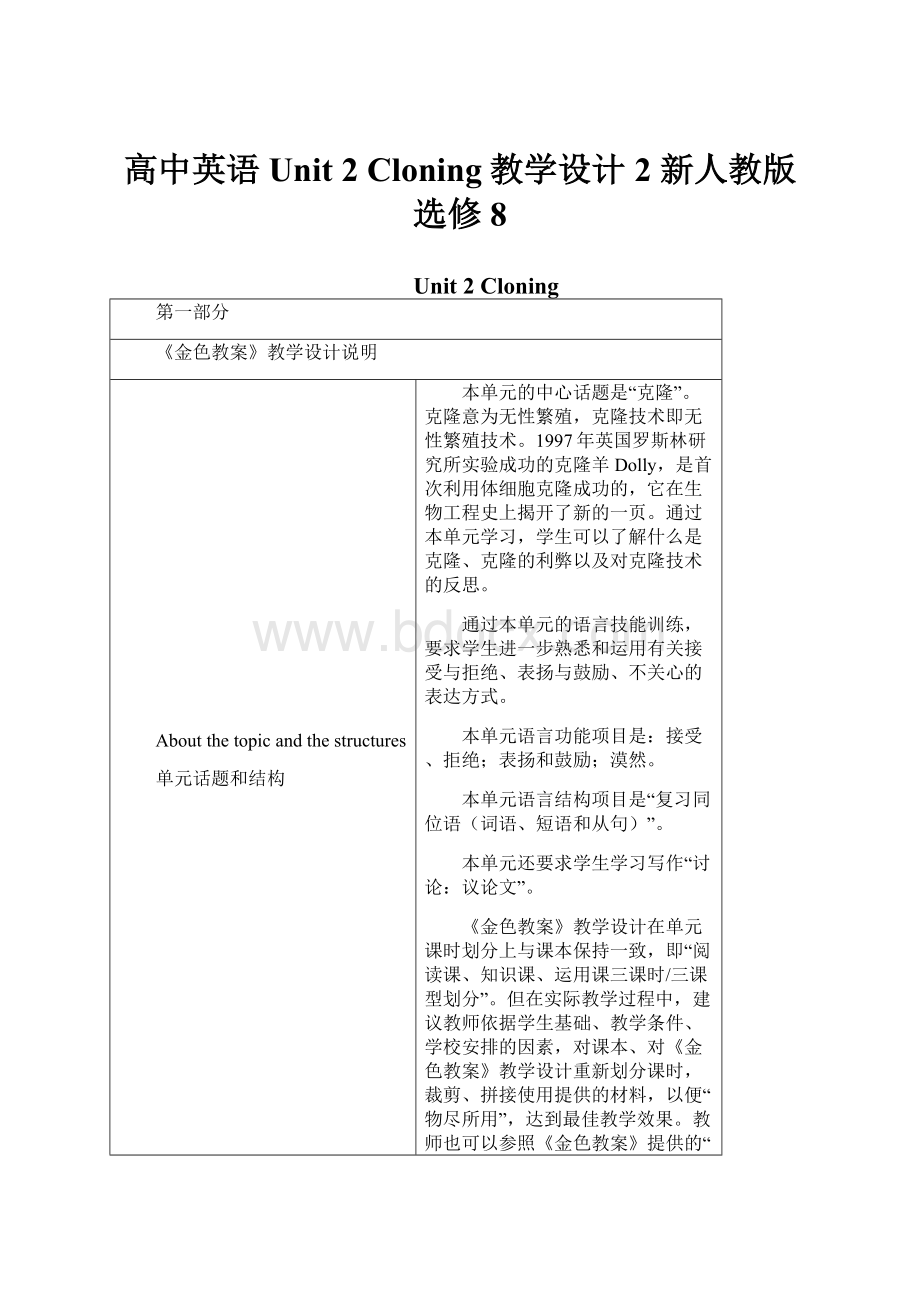高中英语 Unit 2 Cloning教学设计2 新人教版选修8.docx
《高中英语 Unit 2 Cloning教学设计2 新人教版选修8.docx》由会员分享,可在线阅读,更多相关《高中英语 Unit 2 Cloning教学设计2 新人教版选修8.docx(12页珍藏版)》请在冰豆网上搜索。

高中英语Unit2Cloning教学设计2新人教版选修8
Unit2Cloning
第一部分
《金色教案》教学设计说明
Aboutthetopicandthestructures
单元话题和结构
本单元的中心话题是“克隆”。
克隆意为无性繁殖,克隆技术即无性繁殖技术。
1997年英国罗斯林研究所实验成功的克隆羊Dolly,是首次利用体细胞克隆成功的,它在生物工程史上揭开了新的一页。
通过本单元学习,学生可以了解什么是克隆、克隆的利弊以及对克隆技术的反思。
通过本单元的语言技能训练,要求学生进一步熟悉和运用有关接受与拒绝、表扬与鼓励、不关心的表达方式。
本单元语言功能项目是:
接受、拒绝;表扬和鼓励;漠然。
本单元语言结构项目是“复习同位语(词语、短语和从句)”。
本单元还要求学生学习写作“讨论:
议论文”。
《金色教案》教学设计在单元课时划分上与课本保持一致,即“阅读课、知识课、运用课三课时/三课型划分”。
但在实际教学过程中,建议教师依据学生基础、教学条件、学校安排的因素,对课本、对《金色教案》教学设计重新划分课时,裁剪、拼接使用提供的材料,以便“物尽所用”,达到最佳教学效果。
教师也可以参照《金色教案》提供的“实际教学过程课时划分建议”进行教学。
Period1
Reading
阅读课
WarmingUp课本通过展示克隆羊Dolly、人类双胞胎、两条模样相同的小狗以及插枝繁殖的植物图片作为导入。
要求学生以两人小组形式展开讨论,了解两种不同的克隆:
自然的与人工的无性繁殖克隆。
教师也可以采用本书的Warmingupbyleaningtheword“clone”进行热身教学。
Pre-reading课本要求学生提出有关克隆的问题,并列入表内。
表内已提供了四个问题帮助学生思考,以便提出更多问题展开讨论。
这可以激发学生对克隆的兴趣,为阅读做好认识上和知识上的准备。
表中有四个问题:
什么是克隆?
克隆是如何产生的?
人类可以从克隆中得到什么好处?
克隆人将会带来什么问题?
这些问题旨在测试和诱发学生的想象力和判断力,并引发更多的思考。
教师也可以采用本书的Pre-readingbyquestioningandanswering进行预读教学。
Reading介绍了植物与动物克隆的区别、克隆羊Dolly的诞生与死亡、由此引发的争论。
帮助学生进一步认识克隆的意义在于解决医学上的难题,为人类服务。
教师可以参考使用本书提供的下列程序进行本节阅读教学:
Readingaloudtotherecording;Readingforforms;ReadingforthetypeofwritingandsummaryofCLONING:
WHEREISITLEADINGUS?
;Copyingandmakingsentences;Readingandtransforming;Readingthetextagaintodrawadiagramofitandretellthestorywithyourownwords;ClosingdownbylearningmoreaboutDolly
Period2
Learningaboutlanguage
知识课
LearningaboutLanguage分为词汇和语法两方面的训练。
Discoveringusefulwordsandexpressions是本单元的词汇练习题;Discoveringusefulstructures是本单元的语法练习题。
通过本单元的学习,要求学生熟练掌握并运用名词性从句中同位语从句的用法。
教师应紧密结合教材,根据教学大纲进行辅导讲解,应充分利用教材和本书中提供的大量的系统性、针对性强的各种素材,采用讲解、讨论、答疑等方式培养学生运用所学语法知识与技能解决实践问题的能力。
另外,学生应重视自学和自学能力的培养,逐渐熟悉语法项目内容,多看多练,以达到熟能生巧的目的。
教师可以参考使用本书提供的下列程序进行教学:
WarmingupbyreadingaloudtothetapethetextCLONING:
WHEREISITLEADINGUS?
;Learningaboutappositive;Buildinguponyourwordpower;Discoveringusefulwordsandexpressions;Discoveringanddistinguishing;Closingdownbytalkingaboutcloning
Period3
Usinglanguage
运用课
UsingLanguage课本分两部分。
“Reading,discussingandwriting”中提供了一篇关于“恐龙的回归”的阅读材料,讲述了人类自开始克隆动物研究以来一直想要克隆已经绝种动物的愿望,并指出克隆绝种动物的条件,从而得出结论:
恐龙的重生仅仅是个梦想而已。
阅读文章后的问题充分利用学生的想象力,需要独立思考获得答案。
同时提供了四种绝种不到一万年,值得通过克隆恢复的动物的名称及其绝种的年份,要求学生利用表格提供的信息选出最值得克隆的动物并给出充分的理由;最后要求写成一份报告。
这项写作富有挑战性,需要学生大胆想象,以理服人。
“Listeningandspeaking”部分学生听完一段关于克隆是否对动物残忍的对话之后,首先交流听力内容,然后展开讨论,让学生发表自己的看法。
这项练习不仅有助于提高学生的听说能力,更能激发他们对克隆动物健康的关注以及对克隆技术发展前景的再思考,具有现实意义。
教师可以参考使用本书提供的下列程序进行教学:
Warmingupbyreadingaloudthetextonpage11tothetape;Readingforforms;Discussingaboutextinctanimals;Listeningandtalkingaboutcloning;Closingbylookingandsaying
实际教学过程课时划分建议
Period1
将WarmingUp、Pre-reading、Reading和Comprehending整合在一起上一节“阅读课”。
Period2
将Learningaboutlanguage和Workbook中的USINGWORDSANDEXPRESSIONS、USINGSTRUCTURES整合在一起上一节“语言知识课”。
Period3
将Usinglanguage设计为一节包括听说读写单项技能或组合技能训练的“综合技能课
(一)”。
Period4
将Workbook的READINGANDLISTENING和TALKING整合在一起上一节“听说课”。
Period5
将Workbook的LISTENINGTASK、READINGANDWRITINGTASK和SPEAKINGTASK整合为一节“综合技能课
(二)”。
第二部分
教学资源说明
Section1
Background
背景
围绕单元话题“Festivalaroundtheworld”,《金色教案》提供了几则语言规范、短小精干的趣味性材料。
这些材料既可以作为教师教学参考材料为教师所用,也可以直接或改写、重组后作为课堂内外的拓展性阅读材料呈现给学生。
Section2
Explanation
解析
重点针对“阅读课型”中的课文难句,《金色教案》不仅提供了详尽的,就句论句的解析和翻译,而且还以解析的焦点话题为线索,进行了一定的归纳、辨析和总结,以帮助教师更好地实施“语言形式”的教学。
Section3
Vocabulary
词汇
按照课本单元词汇表顺序,《金色教案》重点提供动词、短语搭配的讲解。
所提供的例句,经典、地道、实用、易懂,完全可以直接用于教学。
第三部分
教学测评说明
围绕单元词法、句法项目,《金色教案》提供了长短不一的“单元教学测评”,并备有参考答案供教师使用。
有些测评题目直接源于历年高考试卷,更具有说服力和实用性。
Part1TeachingDesign
第一部分教学设计
Period1Asamplelessonplanforreading
(CLONING:
WHEREISITLEADINGUS?
)
Introduction
Inthisperiod,afterthewarmingup,studentswillfirstbeguidedtopre-readthetextbyquestioningandanswering.Thentheyshallreadaloudtotherecording,readforforms,readforthetypeofwritingandsummaryofCLONING:
WHEREISITLEADINGUS?
.Thestudentswillbeaskedtocopyusefulexpressionsandmakesentences,readandtransformandreadthetextagaintodrawadiagramofitandretellthestorywithyourownwords.TheperiodwillendinstudentslearningmoreaboutDolly.
Objectives
Tohelpstudentsunderstandthetext’sformsandcontentsandlearnaboutcloning
Tohelpstudentscommunicateonthetopicinfocuswiththewords,expressionsandstructureslearnedinthisunit
Focus
Words
clone,differ,undertake,cast,forbid,accumulate,retire,bother,
resist,restore,obtain
Collocations
objectto,infavourof,payoff
Patterns
1.Italsohappensinanimalswhentwinsidenticalinsexandappearanceareproducedfromthesameoriginalegg.
2.Firstly,gardenersuseitallthetimetoproducecommercialquantitiesofplants.
3.ThencamethedisturbingnewsthatDollyhadbecomeseriouslyill.
4.Thequestionthatoccurredtothescientistswas:
“Wouldthisbeamajordifficultyforallclonedanimals?
”
5.Newspaperstoldstoriesofevilleadershopingtoclonethemselvesandreligiousleadersraisedmoralquestions.
Aids
Multimediafacilities,tape-recorder,photos,diagrams
Procedures
1.Warmingupbyleaningtheword“clone”
ScientistinScotlandgrows"impossible"sheepfromonecellofanothersheep.
clone
n.
1.Acell,groupofcells,ororganismthatisdescendedfromandgeneticallyidenticaltoasinglecommonancestor,suchasabacterialcolonywhosemembersarosefromasingleoriginalcell.
2.Anorganismdescendedasexuallyfromasingleancestor,suchasaplantproducedbylayeringorapolypproducedbybudding.
3.ADNAsequence,suchasagene,thatistransferredfromoneorganismtoanotherandreplicatedbygeneticengineeringtechniques.
4.Onethatcopiesorcloselyresemblesanother,asinappearanceorfunction:
"filledwithbusiness-schoolclonesingrayandbluesuits"MichaelM.Thomas.
v.cloned,clon·ing,clones
1.Tomakemultipleidenticalcopiesof(aDNAsequence).
2.Tocreateorpropagate(anorganism)fromaclonecell:
cloneasheep.
3.Toreproduceorpropagateasexually:
cloneaplantvariety.
4.Toproduceacopyof;imitateclosely:
"Thelookhasbeenclonedintocliché"CathleenMcGuigan.
2.Pre-readingbyquestioningandanswering
Whatiscloning?
Wedefinecloningasproductionofacellororganismwiththesamenucleargenomeasanothercellororganism.
Cloningistheprocessofcreatinganidenticalcopyofanoriginal.Acloneinthebiologicalsense,therefore,isasinglecell(likebacteria,lymphocytesetc.)ormulti-cellularorganismthatisgeneticallyidenticaltoanotherlivingorganism.Sometimesthiscanreferto"natural"clonesmadeeitherwhenanorganismreproducesasexuallyorwhentwogeneticallyidenticalindividualsareproducedbyaccident(aswithidenticaltwins),butincommonparlancethecloneisanidenticalcopybysomeconsciousdesign.Alsoseeclone(genetics).
ThetermcloneisderivedfromtheGreekwordfor"twig".Inhorticulture,thespellingclonwasuseduntilthetwentiethcentury;thefinalecameintousetoindicatethevowelisa"longo"insteadofa"shorto".Sincethetermenteredthepopularlexiconinamoregeneralcontext,thespellingclonehasbeenusedexclusively.
3.Readingaloudtotherecording
Wholelanguageteachersaffirmthatreadingaloudteachesyouthestudentsaboutlanguageinawaythatsilentorindependentreadingnevercan.
Readingaloudtothetapehelpsyouthestudentsdevelopandimprovelanguageskills--reading,writing,speaking,andlistening.Andsinceyouthestudentslistenonahigherlevelthanyouread,listeningtootherreadersstimulatesgrowthandunderstandingofvocabularyandlanguagepatterns.
Sowhynothurrytolistenandreadtothetape-recordingofthetextwearegoingtolearntoday?
4.Readingforforms
Readthetextagainto:
cut/thesentenceintothoughtgroups,blackenthepredicates,darkentheconnectivesandunderlinealltheusefulexpressions.
5.ReadingforthetypeofwritingandsummaryofCLONING:
WHEREISITLEADINGUS?
Determiningthetypeofwritingwillhelpyoudeterminetheauthor’stopic(subject),purpose(whyheiswriting),style(howheshouldwrite)andtone(hisattitudetowardhissubject-supportive,condeming,objective,etc.)
Itisimportanttofindmainideaswhenreading.Mainideashelpyourememberimportantinformation.Themainideaofaparagraphtellsthetopicoftheparagraph.Thetopictellswhatallormostofthesentencesareabout.Theothersentencesintheparagrapharecalleddetails.Detailsdescribeorexplainthemainidea.Readthetexttofindthemainidea.
CLONING:
WHEREISITLEADINGUS?
Typeofwriting:
anexpositorywriting
Paragraph1:
Whatiscloning?
Itisawayofmakinganexactcopyofanotheranimalandplant.Wheredoesithappen?
Thishappensinplantswhengardenerstakecuttingsfromgrowingplantstomakenewones,andwhensmallpartsofaplantaretaken/and/grown/inalaboratory.Italsohappensinanimalswhentwinsidenticalinsexandappearanceareproducedfromthesameoriginalegg.Thefactisthattheyarenaturalclonesofeachother.
Paragraph2:
Whatarethetwousesofcloning?
Firstly,gardenersuseitallthetimetoproducecommercialquantitiesofplants.
Secondly,itisvaluableforresearchonnewplantspeciesandmedicalresearchonanimals.
WhatistheprocedureofcloningDolly?
Theprocedureworkslikethis:
1.FemalesheepAprovidesaneggcell.
2.Thenucleusisremovedfromtheeggcell.
3.Theeggcellisreadyforanewnucleus.
4.FemalesheepBprovidesasomaticcellfortheclone.
Thenucleusofthiscellcontainsallthegenesneededtoproduceanewsheep.
5.Thenucleusistakenoutofthesomaticcell.
6.ThenucleusfromsheepBandtheeggcellfromsheepAarejoinedusingelectricity.
7.Thecelldividesandgrowsintoanembryo.
8.Theembryoisputinto